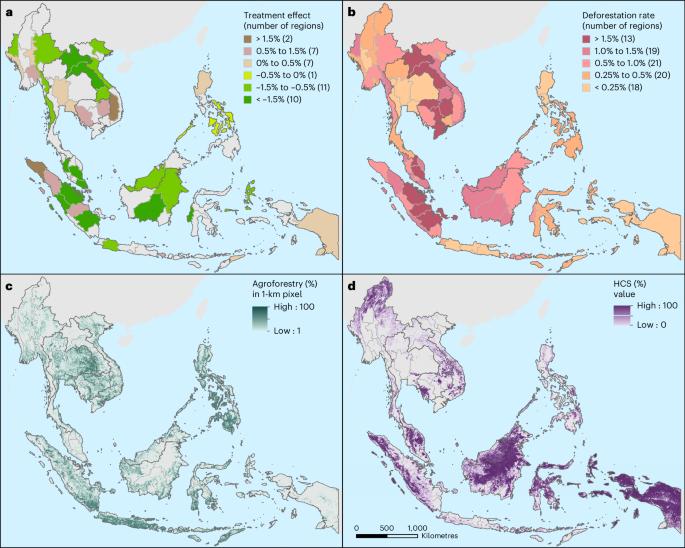减少东南亚高碳储量森林的农林业毁林
IF 27.1
1区 环境科学与生态学
Q1 ENVIRONMENTAL SCIENCES
引用次数: 0
摘要
农林业在当地的社会经济和生态效益方面得到了广泛的实践,但在景观规模上是否有利于降低森林砍伐率仍不清楚。通过因果推理,我们发现了局部差异,但在东南亚38个次国家级区域(P < 0.05),包括高碳储量森林和森林砍伐热点地区,农林业导致的森林砍伐总体净减少为250,319公顷/年或58.8±1550万吨二氧化碳当量/年(P < 0.05)。这些发现为农林业作为一种自然气候解决方案提供了支持和细微差别,特别是在具有高碳储量的生物多样性的东南亚森林中。农林业是一种自然的气候解决方案,在地方尺度上提供生态和社会经济效益,但它是否能在景观尺度上减少森林砍伐尚不清楚。作者使用因果推理来检验农林业对东南亚森林砍伐的影响。本文章由计算机程序翻译,如有差异,请以英文原文为准。

Reduction of deforestation by agroforestry in high carbon stock forests of Southeast Asia
Agroforestry is widely practised for local social-economic and ecological co-benefits, however whether it is beneficial at landscape scale in terms of decreasing deforestation rates remains unclear. Using causal inference, we found local variability but an overall net reduction in deforestation attributed to agroforestry of 250,319 ha yr−1 or 58.8 ± 15.5 Mt CO2 equivalent per year across 38 subnational regions in Southeast Asia (P < 0.05), including high carbon stock forests and deforestation hotspots. These findings provide support and nuance for agroforestry as a natural climate solution especially in biodiverse Southeast Asian forests, which harbour high levels of carbon stocks. Agroforestry is a natural climate solution providing ecological and socio-economic benefits at local scales, however whether it reduces deforestation at landscape scale is still unclear. Authors use causal inference to examine the effects of agroforestry on deforestation across Southeast Asia.
求助全文
通过发布文献求助,成功后即可免费获取论文全文。
去求助
来源期刊

Nature Sustainability
Energy-Renewable Energy, Sustainability and the Environment
CiteScore
41.90
自引率
1.10%
发文量
159
期刊介绍:
Nature Sustainability aims to facilitate cross-disciplinary dialogues and bring together research fields that contribute to understanding how we organize our lives in a finite world and the impacts of our actions.
Nature Sustainability will not only publish fundamental research but also significant investigations into policies and solutions for ensuring human well-being now and in the future.Its ultimate goal is to address the greatest challenges of our time.
 求助内容:
求助内容: 应助结果提醒方式:
应助结果提醒方式:


